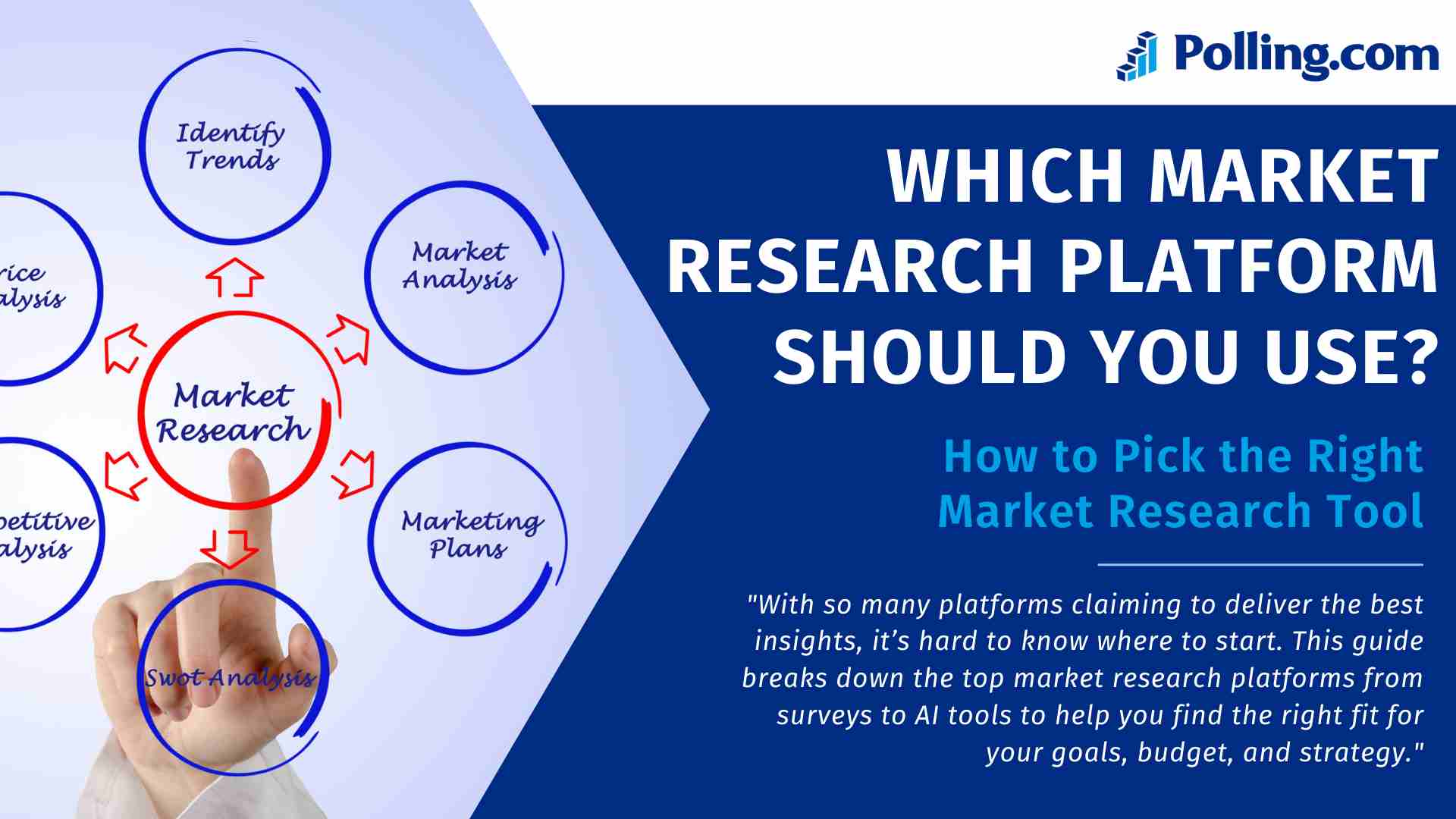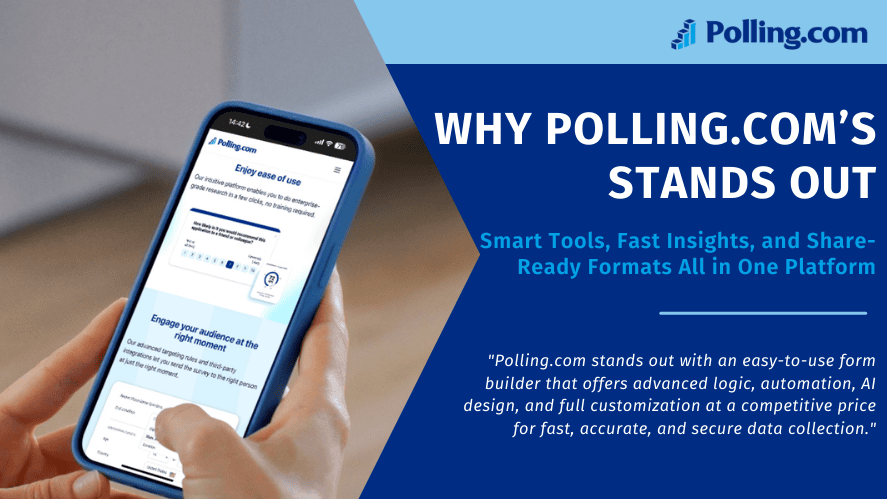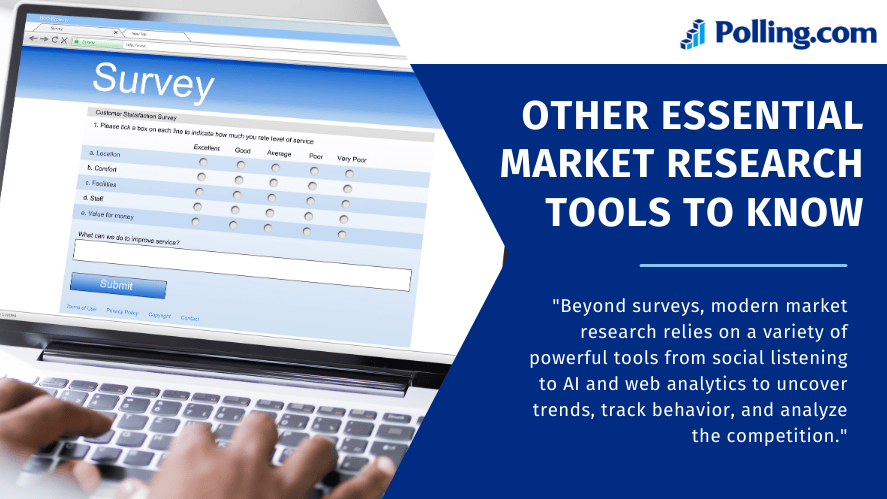
Which Market Research Platform Should You Use?
In a world overflowing with data, choosing the right market research platform can make or break your business decisions. But with hundreds of tools promising better insights, quicker results, and smarter analysis how do you know which one is truly worth your time and budget?
Whether you’re launching a product, testing a new brand message, or trying to understand why customer churn is rising, the right research tool can guide your next step. From AI-powered assistants to tried-and-true survey companies, the market is full of options but not all of them offer the same value, accuracy, or ease of use.
Let’s explore what a market research platform really is, the best tools available in 2025, and how to pick the one that fits your goals best.
What Are Market Research Tools?

A market research platform is any digital tool that helps you collect, analyze, and interpret information about your market, customers, competitors, or industry trends. These platforms range from simple survey tools to advanced AI-driven engines.
Types of Market Research Tools:
- Survey Platforms – Great for collecting direct feedback from customers or the public (e.g., Polling.com, Qualtrics)
- Focus Group & Interview Tools – Used for qualitative research and usability testing (e.g., UserTesting, Lookback)
- Social Listening Tools – Monitors public conversations and sentiment on social media (e.g., Brandwatch, Sprout Social)
- Web Analytics Tools – Tracks user behavior on websites or apps (e.g., Google Analytics)
- AI Insight Tools – Leverages machine learning to uncover patterns and summarize data (e.g., ChatGPT, IBM Watson)
- Competitive Intelligence Tools – Analyzes what your competitors are doing (e.g., SimilarWeb, SEMrush)
Among all these, survey platforms remain the foundation of market research services. Why? Because they give you direct, first-party insights answers straight from the source. When used right, they deliver reliable, scalable, and cost-effective data.
Best Survey Platforms in 2025 (Still the Research MVPs)
Survey tools continue to be the backbone of consumer market research because they offer precision, scalability, and customizability. In 2025, these are the top performers.
Polling.com – The Most Accessible and Insightful Survey Platform
If you’re looking for a smart, fast, and scalable market research platform, Polling.com should be your starting point.

Why choose Polling.com?
- AI-powered insights: Get real-time analytics, trend visualizations, and summaries with zero manual effort.
- Flexible use cases: From Net Promoter Score (NPS) to political polling and product feedback.
- Highly accurate: Trusted by political campaigns and Fortune 500 companies for reliable data.
- Mobile-ready: Collect responses via desktop or mobile wherever your audience is.
- No-code dashboard: Easy enough for first-time users, powerful enough for data teams.
Whether you’re doing understanding customer behavior research or testing new product features, Polling.com makes the process simple yet powerful.
Other Notable Survey Tools
Not every tool is right for every team. Here are other good options, depending on your specific needs:
- Qualtrics Ideal for: Academic studies and large enterprises Pros: Deep data control and integrations Cons: Complex interface, steep learning curve
- SurveyMonkey Ideal for: Quick surveys with ready-to-use templates Pros: Easy setup, popular integrations Cons: Limited features in the free version
- Typeform Ideal for: Interactive and engaging surveys Pros: Beautiful design and UX Cons: Lacks in-depth analysis features
- Google Forms Ideal for: Free, internal data collection Pros: Simple, no cost, ties with Google ecosystem Cons: Not robust for deeper market research needs
While tools like Google Forms and Typeform are fine for surface-level insights, only a few platforms (like Polling.com or Qualtrics) offer the depth and scalability needed for serious business market intelligence solutions.
Other Essential Market Research Tools to Know

Surveys are just one piece of the puzzle. Depending on your research goals, here are other market research platforms that play a big role in 2025.
Social Listening Tools
These tools track real-time conversations across social media, blogs, forums, and more.
- Brandwatch – Tracks sentiment around brands, competitors, and trends.
- Sprout Social – Combines publishing and social analytics.
- Mention – Great for monitoring specific keywords or topics.
Use case: Imagine launching a new feature. Social listening tools let you track how people feel about it without sending a single survey.
They’re perfect for brand insights, managing public perception, and identifying emerging trends fast.
Focus Group & Usability Testing Platforms
Sometimes, you need to hear the tone in someone’s voice or see their reaction to a new design. That’s where qualitative tools come in.
- UserTesting – Record users interacting with your product or website.
- Lookback – Ideal for live interviews and real-time feedback.
- Maze – Combines prototype testing and surveys in one tool.
Use case: If you’re in the design phase of a new app, these platforms reveal user pain points, emotions, and unmet needs helping you shape better experiences.
Web and Behavioral Analytics Tools
If your research is digital-first, you need tools that show how users behave on your site or app.
- Google Analytics – The industry standard for web behavior analysis.
- Hotjar – Visual heatmaps and session recordings for UX insight.
- Mixpanel – Deep dive into product analytics and conversion funnels.
These tools help you explore the types of market research methods that focus on behavioral data. They’re perfect for how to identify market trends in real-time by observing where users click, scroll, or drop off.
AI-Powered Research Assistants
AI tools are now capable of making sense of massive datasets in seconds.
- IBM Watson – Great for text analytics and natural language processing.
- ChatGPT with data plugins – Turns large text into insights or summary reports.
- Crimson Hexagon – Focuses on consumer sentiment and brand health.
If you’re doing legal research platforms or large-scale content analysis, AI tools give you a serious speed advantage. They also help generate automated reports or detect patterns that traditional tools might miss.
Competitive Intelligence Platforms
Sometimes, the smartest move is seeing what others are doing. These tools dig into competitor strategies, pricing, and positioning.
- SimilarWeb – Reveals traffic sources, audience overlap, and competitor web activity.
- Crayon – Tracks pricing, messaging, and product updates in real time.
- SEMrush Market Explorer – Explores market size, share, and keyword gaps.
These are key when doing market opportunity identification, understanding competitor pricing, or refining your business market intelligence strategy.
Which AI Platform Is Best in Accuracy for Research?

Here’s a question many teams ask: “Which AI platform is best in accuracy for research?”
While there are many tools available, accuracy depends on how the AI is used, what kind of data it’s trained on, and how user-friendly the system is. Let’s compare a few top options.
✅ Polling.com – Real-Time AI + Survey Power
Polling.com stands out because it combines AI with real-time, first-party data collection. It doesn’t just analyze data it helps understanding customer behavior as it happens.
- AI cleans and categorizes open-text feedback
- Delivers instant data visualizations
- Works seamlessly across devices and demographics
Best for: Business, academic, or political teams who want accuracy without coding or data science skills.
IBM Watson Analytics
Known for its deep language analysis, IBM Watson is excellent for long-form and academic content.
- Best used for secondary research or document-heavy analysis
- Strong in legal research platforms and structured enterprise data
Best for: Complex, large-scale academic or technical research projects.
Qualtrics with AI Extensions
Qualtrics offers advanced predictive analytics, ideal for academic institutions or large corporations.
- Very powerful with proper setup
- Not recommended for beginners or short-term projects
Best for: Longitudinal studies, structured experiments, and academic surveys.
ChatGPT (With Data Access)
ChatGPT, especially with plugins and tools, is great for summarizing large text blocks, generating themes, or comparing data points.
- Human-like summarization
- Generates customer personas, brand positioning summaries, etc.
Best for: Early-stage ideation, synthesis, and creative analysis.
Which Online Platform Is a Reputable Source for Conducting Research?

When choosing a market research platform, credibility matters. Not all platforms are created equal, and some simply don’t offer reliable or verified data sources. So, which online platform is a reputable source for conducting research?
Let’s look at a few trusted names in the industry, and why they’re often used by professionals across business, academia, and public policy.
1. Polling.com
Trusted by global brands, educators, and campaign managers, Polling.com provides transparent reporting, vetted participant panels, and real-time analytics. It stands out because:
- It uses first-party data collection meaning the insights come directly from your target audience.
- AI algorithms help filter bias, validate responses, and clean data automatically.
- Demographic filters allow precise targeting, from age groups to regions to professions.
Polling.com offers the perfect mix of speed, accuracy, and trust. Whether you’re seeking consumer market research, competitive intelligence solutions, or customer feedback tools, it consistently delivers reliable results.
2. Pew Research Center
This nonprofit is known for conducting public studies on politics, media, technology, and society.
- Data is often publicly available and well-documented.
- Ideal for background research or secondary data gathering.
Note: Pew doesn’t offer customizable surveys for businesses it’s more for reference and insight.
3. Qualtrics
Although primarily built for academic and enterprise users, Qualtrics is widely respected for its data accuracy and research rigor.
- Offers advanced AI tools for large-scale analysis.
- Useful for those in need of highly structured research protocols.
4. Google Scholar
While not a traditional market research platform, Google Scholar is a valuable source for published studies, white papers, and academic research. It’s especially helpful when doing how to do customer research or benchmarking.
Summary: If you’re conducting company research, planning a marketing campaign, or exploring market opportunity identification, start with Polling.com. For additional secondary insights, platforms like Pew and Google Scholar add depth and context.
Use Cases: When to Use Each Type of Market Research Tool
Different research goals call for different tools. Here’s a breakdown of when and why to use each type of market research platform, depending on what insights you’re trying to gain.
Survey Tools (e.g., Polling.com)
Best for: Scalable, quantitative research Use Cases:
- Measuring brand awareness or customer satisfaction (NPS)
- Conducting prolific surveys across large demographics
- Collecting fast, actionable feedback pre-launch
- Tracking sentiment after marketing campaigns
- Understanding customer behavior at scale
Polling.com is ideal for all of the above especially when time and budget are tight but you still need high data quality.
Social Listening Tools
Best for: Real-time brand monitoring and reputation management Use Cases:
- Tracking viral content or sentiment during product launches
- Measuring share of voice vs. competitors
- Spotting emerging trends on Twitter(X), TikTok, Reddit, etc.
These tools work best when you need to know how to identify market trends early.
Focus Groups & Interviews
Best for: Deep qualitative insights Use Cases:
- Testing UX flows or designs
- Exploring emotional responses to ads or branding
- Validating assumptions before full-scale launches
Platforms like UserTesting and Maze offer moderated and unmoderated testing, often used by UX teams or product managers.
Web Analytics
Best for: Behavior analysis and conversion tracking Use Cases:
- Analyzing user paths and engagement (Hotjar, Google Analytics)
- Optimizing landing pages for conversion
- Identifying bounce rates and friction points in digital journeys
These tools complement survey data by showing not just what users say but what they actually do.
Competitive Tools
Best for: Market scanning and positioning Use Cases:
- Analyzing competitor pricing strategies
- Exploring white space in new product categories
- Tracking updates in competitors’ messaging and web traffic
If you’re creating a new product or entering a crowded niche, competitive intelligence solutions are your best friend.
How to Choose the Right Market Research Tool for Your Business or Project

With all these tools at your disposal, how do you actually choose the right one? It starts with clarity.
Step 1: Define Your Research Goal
What exactly are you trying to learn?
- Are you validating a product idea?
- Testing messaging or creative?
- Looking to improve user experience?
- Exploring a new market segment?
For quantitative validation → Use a survey platform For qualitative feedback → Try focus groups or interviews For tracking behavior → Use web or marketing analytics tools
Step 2: Consider Speed, Depth, and Budget
Are you on a tight timeline? Do you need surface-level insights or deep academic rigor? Your constraints will shape the best tool.
| Tool Type | Speed | Depth | Cost |
|---|---|---|---|
| Polling.com | Fast | Medium–High | Low–Mid |
| Qualtrics | Medium | High | High |
| Google Forms | Fast | Low | Free |
| UserTesting | Medium | High | Medium |
| SimilarWeb | Fast | Medium | Mid–High |
| Brandwatch | Medium | Medium | Medium |
Step 3: Prioritize Scalability and Accuracy
If you expect to run research regularly, look for a platform that scales. This includes:
- Automated workflows (like in Polling.com)
- Easy export formats (CSV, PDF, dashboards)
- Built-in analytics or AI support
Tools that grow with you are more cost-effective in the long run, especially if you’re building an in-house research process.
Final Thoughts: Which Market Research Platform Should You Use?
With so many options on the market, picking a market research platform can feel overwhelming. But the truth is: it all comes down to your goal, resources, and need for accuracy.
✅ Start with a survey platform like Polling.com if you want fast, scalable, and reliable data collection. It’s ideal for everything from product feedback tools to political polling to brand sentiment tracking.
✅ Use AI-powered marketing tools or analytics platforms to enrich your understanding of how your customers behave and interact with your brand online.
✅ Layer in social listening, competitive intelligence, or focus groups when deeper insights are required.
No matter your industry or size, doing research isn’t optional it’s the competitive edge every modern business needs.
Ready to Get Started?
Polling.com offers a free trial, an intuitive interface, and AI-powered analysis. It’s the smartest way to collect feedback, test new ideas, and understand your market better than ever.
🚀 Don’t just guess what your customers want. Ask them. Start with Polling.com – your first step toward smarter decisions.
